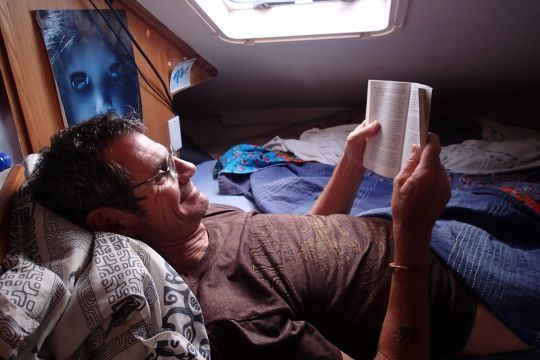To ensure a permanent watch
The national regulation to prevent collisions at sea, the famous RIPAM, clearly stipulates that one must keep a permanent watch while sailing. This provision is obviously impossible to apply when sailing alone. It is difficult with a small crew and implies a judicious distribution of night watches.

Offshore sailing is often practiced in family. On all the oceans of the world, many crews are made up of a couple, sometimes with children or an inexperienced crew member. This is generally referred to as a skeleton crew.
Guarantee the safety of the boat
A priori, and apart from particular relational difficulties, the distribution of watches does not pose a major problem.
aboard a small pleasure craft, it is usually quite different. We will not mention the practices that consist in reducing the sail for the night before dozing off for an indefinite period of time autorassurent by evoking the use of various electronic devices, supposed to warn them of the presence of an obstacle
The sea is a space of great freedom, each captain is the only one responsible for his choices. Then, at sea, it is the sea that decides everything. And this is one of the reasons why nothing can replace a visual watch.

Thus, it is essential to organize the night shifts judiciously
The main objective of this organization is to make sure that the person in charge of the shift is really able to watch, without falling asleep. This is not an easy task. When you're young, it's relatively easy, but still. Then, it gets harder as you get older
4-hour shifts, merchant marine style, a good idea?
We do not recommend the adoption of long 4-hour shifts in the manner of the Merchant Navy. They turn out to be quite long. We clearly prefer 3-hour shifts which seem to be better adapted to pleasure boating, especially with a reduced crew. In the same way, we would not recommend the "poetic-laxist" system which consists in not organizing anything at all, and letting things happen according to the moods or the states of fatigue of each and everyone.
Proposal for the organization of double shifts at sea
After testing several different combinations, here are our conclusions and a hybrid method that has given satisfaction over hundreds of hours of offshore sailing.
- Practice 2.5 hour shifts throughout the day
- The last shift of this type will end about 2 hours after dark
- The one who is best suited will then start a 6-hour shift in a row. Of course, there is no way to stay awake and alert during such a period. The only way to ensure an efficient watch (but not 100%, unfortunately) is to equip yourself with an alarm clock. You can set it for 10 to 15 minutes, depending on whether you are on a fast or a slow boat. You start by conscientiously inspecting the horizon before settling down as best you can for a few minutes of sleep at the helm. As soon as the alarm rings, we start the cycle again: glance at the navigation instruments, inspect the horizon and the sky, reset the alarm clock.
- After having spent 6 hours at this rate, the crew member, who has just had a good rest, will take over. During this time, the one who has finished the long shift quickly falls into a deep sleep. This is the most restorative sleep.
- Two and a half hours later, we adopt the "day" rhythm again until about two hours after the beginning of the night.

An organization to be adapted to the crew
We are all different from each other. Not all individuals have the same sleep needs. Therefore, this information is only a suggestion that must be considered and adjusted on a case-by-case basis.









